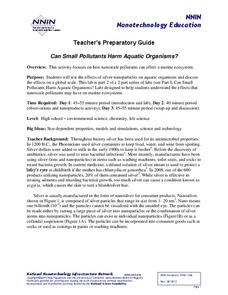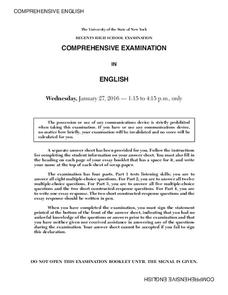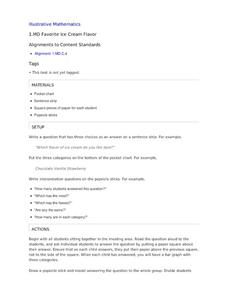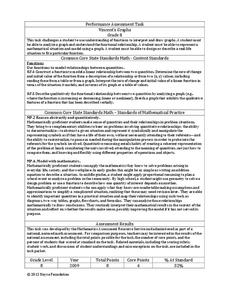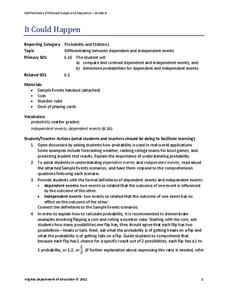National Nanotechnology Infrastructure Network
Can Small Pollutants Harm Aquatic Organisms?
Nanoparticles have toxic effects on plant and animal life—even though you can't see them. The second instructional activity of a two-part series has young scientists conduct an experiment that exposes plant and animals to nanoparticle...
New York State Education Department
Comprehensive English Examination: January 2016
Poetry and prose often have more in common than it initially appears. A sample comprehensive English exam has test-takers compare and contrast two passages to answer short response questions. The exam, which is part of a larger set of...
Curated OER
Cell, Socks, and Sex
Donate old socks for science! Young biologists model mitosis and meiosis, using socks as chromosomes and a balloon as a nucleus. This ingenious idea for modeling cell division will be more memorable to your young biologists than any set...
Teach Engineering
Determining Densities
Don't be dense—use a robust resource. The second installment of a five-part Floaters and Sinkers unit has learners determine the densities of several objects. As part of the activity, they learn the displacement method for finding...
Curated OER
Perfect Tenses
As you explore the perfect tenses, direct your class to this resource, which provides explanation and examples for reference as well as an online interactive exercise for practice. They can first read up on haber and either continue...
Macmillan Education
Understanding Poetry (Elementary)
Introduce young readers to poetry analysis with a worksheet that uses Emily Bronte's "Spellbound" to model how poets use word choice, the sounds of words, the repetition of words, and rhyming patterns to create the mood, tone, and...
Middle Tennessee State University
The Invention of the Telephone
All of the people in your class would agree that life would be different without the invention of the telephone! Study Alexander Graham Bell's most famous and influential invention through the primary source document of his...
Peace Corps
Defining Culture
How has culture shaped you? Middle and high schoolers examine different aspects of one's culture, including religious beliefs, social customs, and family traditions, and discuss the ways that their personalities have been formed by these...
Advocates for Human Rights
Who are Immigrants?
What do Jerry Yang, Patrick Ewing, John Muir, Charlize Theron, Peter Jennings, and Saint Frances X Cabrini all have in common? They are all immigrants to the United States. Famous and not-so-famous immigrants are the focus of a resource...
Kansas Music Educators Association
Games for the Elementary Music Classroom
Perfect for music specialists, classroom teachers, and substitutes, a packet of 18 games includes complete lessons as well as short activities for when you have some extra time at the end of class.
K12 Reader
What Is a Simile?
As fun as a barrel of monkeys, this figurative language worksheet will engage your students in learning to write similes. Asking them to first think of adjectives describing the six nouns listed on the page, this exercise has...
Illustrative Mathematics
Favorite Ice Cream Flavor
What better way to engage children in a math lesson than by talking about ice cream? Using a pocket chart or piece of chart paper, the class works together creating a bar graph of the their favorite ice cream flavors. Learners then work...
Illustrative Mathematics
Making a Clock
Have a fun time teaching children to read analog clocks with this whole-group math activity. Using large sets of the numerals 1-12 and 0, 5, 10...55, the teacher creates a large clock on either the carpet or the white board, explaining...
Road to Grammar
Mastering the Present Perfect Tense
You have found a solid resource for covering the present perfect tense. Starting with explanation and examples, this resource moves quickly into a series of exercises that target specific elements of the present perfect...
Math Worksheets Land
Holiday Ratios
Add some holiday cheer to your math lessons with this problem-solving instructional activity. From problems comparing the number of ears and legs of Santa's reindeer, to finding the ratio of colored lights on a Christmas...
Chicago Botanic Garden
Calculating Your Carbon Footprint
Unplugging from technology for one day per week will decrease your carbon footprint—are you up to the challenge? Part two in a series of three allows individuals to explore their personal carbon footprints. By first taking a quiz at home...
New York State Education Department
Comprehensive English Examination: June 2013
Tired of having to create your own formative assessments? Use a ready-made resource to assess listening and reading comprehension, essay writing, and literary skills. Scholars work through 28 questions in response to five different texts.
Charleston School District
Solving with Inverse Operations
What does order of operations have to do with solving equations? A video explains solving two-step equations using a do/undo chart. Learners recognize the operations within an equation and use inverse operations to undo those...
Charleston School District
Solving Equations with the Distributive Property
Now there are parentheses in these equations? As the lessons continue in this series, equations get progressively more complex. Eighth graders solve equations by applying the distributive property before using inverse operations.
Inside Mathematics
Vencent's Graphs
I like algebra, but graphing is where I draw the line! Worksheet includes three multiple-part questions on interpreting and drawing line graphs. It focuses on the abstract where neither axis has numbers written in, though both are...
EngageNY
Estimating Probability Distributions Empirically 1
What if you don't have theoretical probabilities with which to create probability distributions? The 11th installment of a 21-part module has scholars collecting data through a survey. The results of the survey provide empirical data to...
Virginia Department of Education
It Could Happen
Understanding of probability will probably increase with the use of a refined resource. Pupils learn to distinguish between dependent and independent events as they calculate the probabilities of these types of events in various...
Novelinks
Words by Heart: Guided Imagery
Sad, depressed, miserable, inconsolable, forlorn: so many synonyms have a lot of variety with their connotations. Through the guided imagery activity, writers explore the use of connotation and its influence on imagery and description by...
Kenan Fellows
Ready, Set, Save on Solar Energy Technology!
Does your class have a bright future in the solar energy industry? Science scholars take an in-depth look at what's new in solar technology. After completing research into the solar industry, participants create and market a product in...
